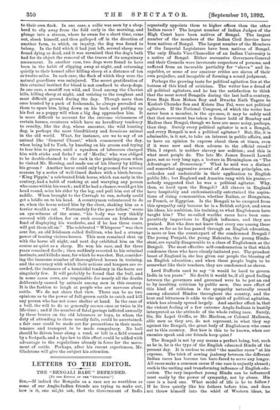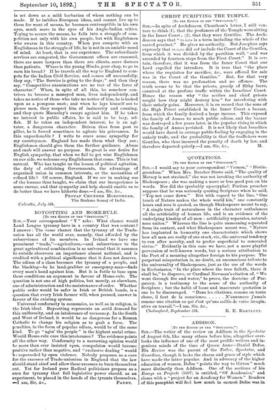LETTERS TO THE EDITOR.
THE "BENGALI BABU" DEFENDED.
[To THE EDITOR OF TEE " SPECTATOE."]
Sin,—If indeed the Bengalis as a race are so worthless as some of our Anglo-Indian friends are trying to make out, how is it, one might ask, that the Government of India repeatedly appoints them to higher offices than the other Indian races ? The largest number of Indian Judges of the High Court have been natives of Bengal. The largest number of the members of the Indian Civil Service have been natives of Bengal. The largest number of the Members of the Imperial Legislature have been natives of Bengal. The only Hindu Vice-Chancellor of an Indian University is a native of Bengal. Either successive Governors-General and their Councils were inveterate respectors of persons, and suffered from an incurable partiality for " slaves " and in- capables, or some of our amateur critics are slaves of their own prejudice, and incapable of forming a sound judgment.
Perhaps the growing taste for political agitation lies at the bottom of this kind of criticism. The writer has a dread of all political agitators, and he has the satisfaction to think that the most noted Bengalis during the last half-a-century, from Raja Ram Mohan Roy and Dwarka Nath Tagore to Keshub Chunder Sen and Kristo Das Pal, were not political agitators. If the National Congress, of which the writer has never been a member, is the eye-sore, it may be safely said that that movement has taken a firmer hold of Bombay and Madras than Bengal, though we here are more noisy, perhaps, than they. Surely every political agitator is not a Bengali, and every Bengali is not a political agitator P But, Sir, it is admissible, is it not, to take an interest in public affairs, and to have an opinion to express about them at times, even if it were now and then adverse to the official creed l This, I expect, is neither slavery nor sedition ; and this is what most people do. The late Mr. James Russell Lowell gave, not so very long ago, a lecture in Birmingham on " The Advantages of Democracy." What he said was a distinct and somewhat aggressive avowal of American principles, un- orthodox and undesirable in their application to English public life ; but England and America rang with his praise,— nobody suggested that he was a political agitator. Why, then, so hard upon the Bengali ? All classes in England have hospitably and enthusiastically entertained the aspira- tions of rising communities, whether Italian, or Hungarian, or French, or Egyptian. Is the Bengali to be excepted from this sympathy only because he is a British subject, and owes- his ideas, his ambition, his training, to what Englishmen have taught him? The so-called warlike races have been com- paratively impervious to English influence, and they are praised. But who does not know that every one among these races, so far as he has passed through an English education, is more or less the counterpart of the condemned Bengali ? The young Punjabi, the young Mahratta, the young Hindu- stani, are equally disagreeable to a class of Englishmen as the Bengali. The most effective self-condemnation is that which condemns those who have closely imitated you. The proudest boast of England is, she has given our people the blessing of an English education ; and when these people begin to be somewhat like their teachers, they are condemned as slaves.
Lord Dufferin used to say "it would be hard to govern India in ten years." No doubt it would be, if all good feeling between the governors and governed were to be put an end to by insulting criticism by public men. One sure effect of this kind of criticism is the sympathy naturally roused. among educated Hindus throughout the country, and the heat and bitterness it adds to the spirit of political agitation, which has already spread largely. And another effect is, that the violent feeling of a few extreme Anglo-Indians is hastily interpreted as the attitude of the whole ruling race. Surely, Sir, Sir Lepel Griffin, or Mr. Maclean, or Colonel Malleson, able men as they are, do not represent, in what they say against the Bengali, the great body of Englishmen who come out to this country. But how is this to be known, when our enemies speak and our friends keep quiet ?
The Bengali is not by any means a perfect being, but, such as he is, be is the type of the English educated Hindu of the present day. It is useless to extol "the manlier races" at his expense. The trick of sowing jealousy between the different Indian races has become too bare-faced to serve any longer. All races make a common cause if one race is unjustly abused; such is the uniting and transforming influence of English edu- cation. The very imperfect young Hindu can be influenced most easily by the power of sympathy, not by abuse. His case is a hard one. What model of life is he to follow ? If he lives quietly like his fathers before him, and does not throw himself into the whirl of Western ideas, he
is set down as a mild barbarian of whom nothing can be made. If he imbibes European ideas, and cannot live up to them for want of means, he becomes contemptible in his own eyes, much more in the eyes of his Anglo-Indian critics. Trying to secure the means, he falls into a struggle of com- petition not only with his own people, but with Englishmen who swarm in this country. When you compete with an Englishman in the struggle of life, he is not in an amiable mood of mind. At least, that is our experience. The subordinate services are congested, the Government offices are crammed, there are more lawyers than there are clients, more doctors than patients. Where is the young Hindu, poor chap, to go to earn his bread P If he travels all the way to England to com- pete for the Indian Civil Service, and comes off successfully, they say, " The Service is going to the dogs ;" and then they say, " Competitive examinations are no test of the force of character." When, in spite of all this, he somehow con- trives to become a moneyed man, lives independently, and takes no notice of those who take no notice of him, he is looked upon as a pompous snob; and when he lays himself out to please men, they suspect him of insincerity and cunning, and they quote Macaulay's essays against him. If he takes no interest in public affairs, he is said to be lazy, sel- fish. If he takes an independent interest, he is an agi- tator, a dangerous character. Driven thus from post to pillar, he is forced sometimes to agitate his grievances. Is this unpardonable P I write to crave some sympathy for my countrymen. England has made them what they are ; Englishmen should give them the further guidance. Abuse and snub will answer no purpose. So great is our desire for English sympathy, that when we fail to get wise Englishmen on our side, we welcome any Englishmen that come. This is but natural. Who has taught us the lesson of political agitation, the duty of criticising Governments, the advantage of organised union in common interests, or the necessities of refined life ? Of course, England. If we err in making use of the lessons thus taught, we claim that our inexperience is some excuse, and that sympathy and help should enable us to do better than we have hitherto done.—I am, Sir, Sze.,
PROTAP CHUNDER MOZOOMDAR,
The Brahmo Somaj of India.
Calcutta, July 5th.



































 Previous page
Previous page